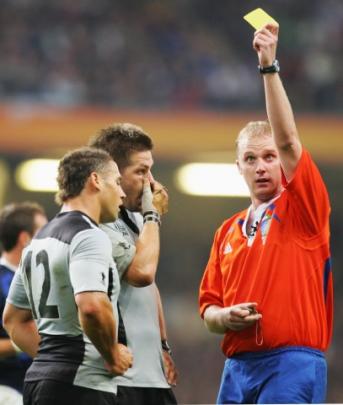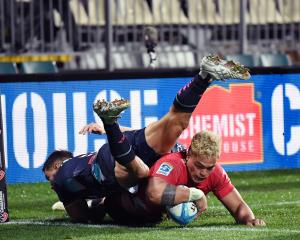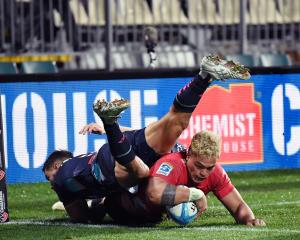One of the biggest issues facing sports in contemporary times has been the treatment of referees by players and supporters, particularly at the junior and community levels, says ODT rugby writer Jeff Cheshire. In part two of a two-part article on this issue he looks at what players should remember about the people officiating in their games.
Having watched and played for much of my life, I have had plenty of experience dealing with referees of all capacities, and have taken the whistle myself in primary and intermediate schools rippa rugby, as well as secondary schools basketball. It has been an enlightening experience. Having now been involved on both sides, I have learnt a lot of things that I consider extremely valuable and that I wish to share, to help benefit sport as a whole.
For players
The referee will call a game how they see it
If nothing else, it is important that players understand this. In a perfect world every referee would call every game perfectly. Unfortunately that is not going to happen. In most sports there are just so many things happening so quickly that it is impractical for them to see everything that happens. Things will be missed and generally they will balance out between both teams. That is something that must be accepted on all levels.
Further, they are not necessarily going to see things the way you see them. Supporters on the sideline may claim a pass was forward, whereas the referee saw it and felt it was okay. Some instances can be fairly touch and go but the referee has to make the call as he saw it. While it is okay to ask questions regarding the rulings, any debates should be around the way the laws and rules were applied to what the referee saw, not around whether something actually happened.
While it can be frustrating, this is the key point to remember. Referees cannot call based on suspicion or sound (generally), so if they did not see it, they will allow play to continue. Likewise if they did see something, they will call it. Can you really argue with that?
Understand the referee's resources
At lower levels you generally only have one referee to cover a game. In fact often in junior sport you may have the coaches refereeing. Contrast this to the top level. In rugby there is a team of four officials, the NRL has five, while basketball has three. That is multiple sets of eyes that can monitor different things and ensure there is always someone in position to see something happen. Even if they do miss it or are unsure, the TMO can be used to review a play. Yet they still get things wrong, sometimes badly.
In all due respect to the local referees who do a fantastic job, their job is made far harder. Think of a rugby referee at a ruck. They have to monitor the breakdown, while also watching the offside lines both in front of and behind them. Without assistants this really is impossible to do all the time.
Be honest and polite
Different referees have different takes on this, but I do not mind players talking to me as long as they are not complaining. If you ask the referee a question calmly and politely then you can expect to get a similar response. Likewise, it always pays to be honest. This applies predominantly to sport where there is only one referee. If there are times when the referee did not see what happened, sometimes they will ask the players what happened with the expectation that they will be honest.
More often than not you find both teams are in agreement as to what the right call is. It makes the referee's job that much easier and is far better than them having to guess, which really is just as bad as a dishonest response.
On another note, it is always nice to hear that you have done a good job, or be thanked. There have been multiple instances where kids and teachers have come and shaken my hand or said thank you and they are instances that you remember. It says a lot about the team and those involved and you remember those who do.
Understand what it is like refereeing under pressure
Every now and again a referee will find themselves in an intense game, or a situation where the stakes are that much higher. For a top referee it could be a World Cup playoff game, for an inexperienced referee it could be any game at all.
The problem with being in these situations is that you start to second-guess what you see. Take basketball for instance. You see a foul. But was it really a foul? Was the defensive player really in an illegal guarding position or was the offensive player just out of control and ran into an opponent playing good defence? You get a split-second to make that decision and if in doubt you are probably not going to make the call, because that is the safer thing to do for an inexperienced referee.
It is not just at the lower levels either. Remember a certain quarterfinal where the All Blacks could not buy a decision against the French? Yep, that was probably a similar case to what was happening here. Wayne Barnes was inexperienced at international level and the pressure of a quarterfinal was too much. He was seeing things, second-guessing them and doing the classic manoeuvre of swallowing the whistle under pressure. It is frustrating, but it is worth remembering that you are probably only making the situation worse by reacting to a missed call. As the pressure mounts, it takes more and more time to process what happened and often it is time that is not available to the referee.
Have a go at refereeing yourself; see what it is really like It is a belief of this writer that everyone involved in sport should have a go at refereeing. Only after you have actually experienced it can you understand what it is like to have a whistle in your mouth and to actually have to make the call. While you could easily stand on the sideline and identify every time an infringement has occurred, it is much more difficult when you are the one that is in control.
They are there for your benefit
One final point: most referees are officiating so you can get a game. Particularly at the lower levels these referees are often unpaid and in many cases may not even be referees. In fact they may hate doing it. However, they do it because they know if they do not, the players will not get a game. These people are giving up their time to help out others. The least those involved with the game can do is to be polite to, or at least tolerate, that individual.
It is very, very rare that a referee would be legitimately biased, and claims that a referee "cheated" are often unfounded. Ninety-eight percent of the people I have dealt have been wonderful, but you are always going to get the occasional intense person. There was one occasion where both teams seemed convinced they were getting the raw end of the stick and with 15 minutes left in the game, it became tempting to pack up and let them referee their own game. It made me wonder why I had even bothered coming in to referee the game, knowing that I could be doing something else. Just a little something to remember next time you get frustrated with a referee. They are probably thinking something similar.












